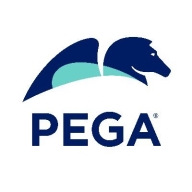

Pega Platform and ARIS BPA compete in the enterprise software market, specifically in workflow management and process documentation. Pega Platform seems to have an edge in handling complex workflows effectively, while ARIS BPA excels in providing a singular view of enterprise processes through comprehensive modeling and analysis.
Features: Pega Platform is known for its case management, integration services, and low-code capabilities. It offers a robust and unified architecture, enabling enterprises to manage complex workflows efficiently. On the other hand, ARIS BPA focuses on comprehensive process modeling and analysis. It offers rich visual management and flexibility in process documentation, providing a singular view of enterprise processes essential for strategy and governance.
Room for Improvement: Pega Platform is often criticized for its complexity and high pricing, which necessitates experienced developers. There's a call for better cloud integration and improved AI capabilities. ARIS BPA, while praised for its modeling, suffers from high costs and complex licensing. Users also seek better integration, increased automation, and a more user-friendly interface.
Ease of Deployment and Customer Service: Pega's versatile deployment options include on-premises, public, private, and hybrid cloud environments, offering flexibility for large enterprises. Customer service receives mixed reviews due to the complexity of resolving issues. ARIS BPA also provides various deployment options but leans towards enterprises with its complexity and cost. Customer service is generally reliable but can face issues with integration and responsiveness, affecting implementation and problem resolution.
Pricing and ROI: Pega Platform is recognized as expensive, tailored for large enterprises with substantial budgets. However, it delivers significant ROI through streamlined business processes and rapid development, though licenses scaled by users or usage can deter smaller businesses. ARIS BPA also demands high pricing, suitable for large organizations with its comprehensive tool suite. When fully leveraged, it offers detailed process insights and governance, justified by the considerable ROI against initial costs.
The consultants are fine, however, reliance on single experts for modules can be risky.
The technical support from Pega is very low, rating a one or two out of ten.
I never needed support from the platform standpoint, but if additional features are required, we have regular meetings with the product team for feedback.
Pega's technical support team is very helpful.
For user scalability, it is a matter of licenses, while functional scalability is supported and easy to implement.
ARIS BPA has high scalability and wide scalability for any enterprise or organization.
Currently, big banking providers and insurance providers, even the members for healthcare payers, are using more than millions of operations on a daily or weekly basis.
The stability of ARIS BPM is quite strong, rated eight out of ten.
Software AG should focus on developing AI models for ARIS BPA on-premises, particularly in user interfaces, as well as creating predefined business processes for common areas such as HR and finance.
Software AG could improve this by making the database more open.
ARIS BPA needs to be more accurate when generating documents.
With the recent development of AI agents in Pega Platform 24.2, the adoption is not heavy due to regulations around using external LLM by customers, especially regulated customers in BFSS and healthcare.
Pega introduced Constellation, which allows a user to build a more engaging visual experience.
My learning curve in robotics has been challenging.
Pega is priced higher than open-source options like Flowable but is suitable for large-scale industries like banking and insurance.
The pricing is expensive, and this is an issue.
From a licensing perspective, it is higher than the competition.
ARIS BPA is a tool to build models and frameworks for organizations or reengineer business processes from both functional and business perspectives.
The maintenance capabilities of ARIS BPM and the strong underlying database are particularly valuable.
The solution is very stable with no stability issues.
Management capabilities such as dashboards.
Pega Platform is excellent for enterprise-level solutions with integrations to entire systems, including case management, service orchestration, CRM, decision-making capabilities, digital process automation, and AI-driven functionalities.
| Product | Market Share (%) |
|---|---|
| Pega Platform | 5.2% |
| ARIS BPA | 4.1% |
| Other | 90.7% |


| Company Size | Count |
|---|---|
| Small Business | 32 |
| Midsize Enterprise | 8 |
| Large Enterprise | 47 |
| Company Size | Count |
|---|---|
| Small Business | 9 |
| Midsize Enterprise | 15 |
| Large Enterprise | 68 |
ARIS is the market-leading solution for professional business process management and modeling. Whether you want to document the "as-is" state of your operations for quality or certification reasons or design the "to-be" in terms of continuous improvement in your transformation program, ARIS is the best choice for establishing a single source of truth regarding all process excellence topics in your organization. It is for any organization looking to digitally transform their business, increase operational excellence and customer experience and ensure compliance in execution. ARIS helps you to make the most out of your processes with Process Mining, Risk & Compliance Management, RPA and much more.
What makes the difference?
ARIS is the market-leading solution for any organization and ideally suited to digitally transform the organization, increase operational excellence and customer experience and ensure compliance in execution.
Pega Platform provides flexible business process management with a focus on rapid application development and automation through a low-code approach, enhancing efficiency across sectors.
Pega Platform is renowned for its ability to streamline operations with robust automation features, including robotic process automation and decision-making capabilities. Its intuitive interface and workflow management contribute to a reputation for enhancing business processes. Although users face challenges with integration limitations and high licensing costs, they benefit from rapid deployment and efficient process adaptations. The unified architecture reduces complexity, while case management and integration services support digital transformations in sectors such as banking, insurance, and healthcare.
What are the key features of Pega Platform?In industries like insurance, banking, healthcare, and government, Pega Platform is implemented to automate diverse workflows, supporting initiatives from claims processing to customer onboarding. Enterprises use Pega for case management and digital transformations, valuing its out-of-the-box integrations and real-time reporting capabilities to boost operational automation and enhance customer experiences.
We monitor all Business Process Management (BPM) reviews to prevent fraudulent reviews and keep review quality high. We do not post reviews by company employees or direct competitors. We validate each review for authenticity via cross-reference with LinkedIn, and personal follow-up with the reviewer when necessary.